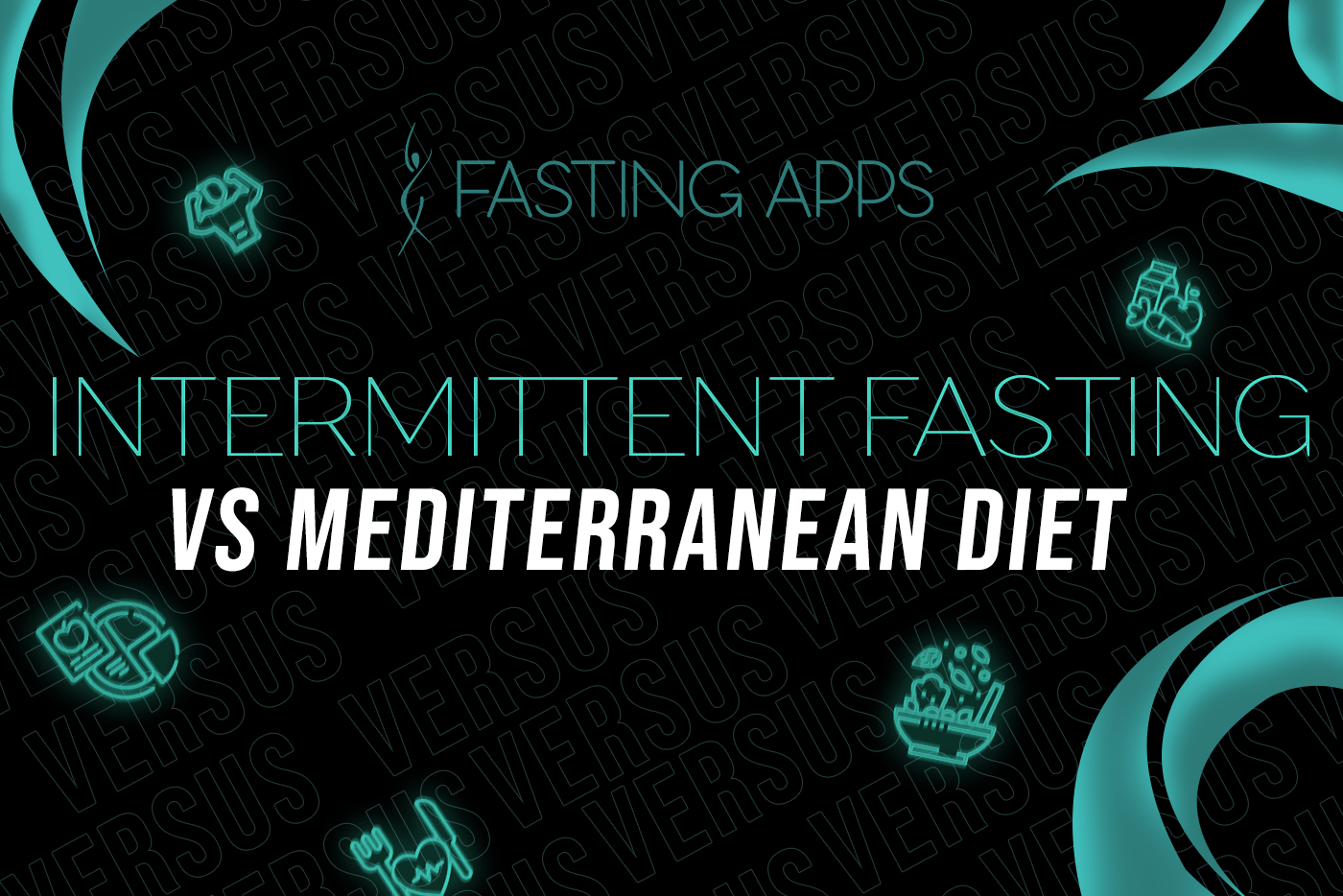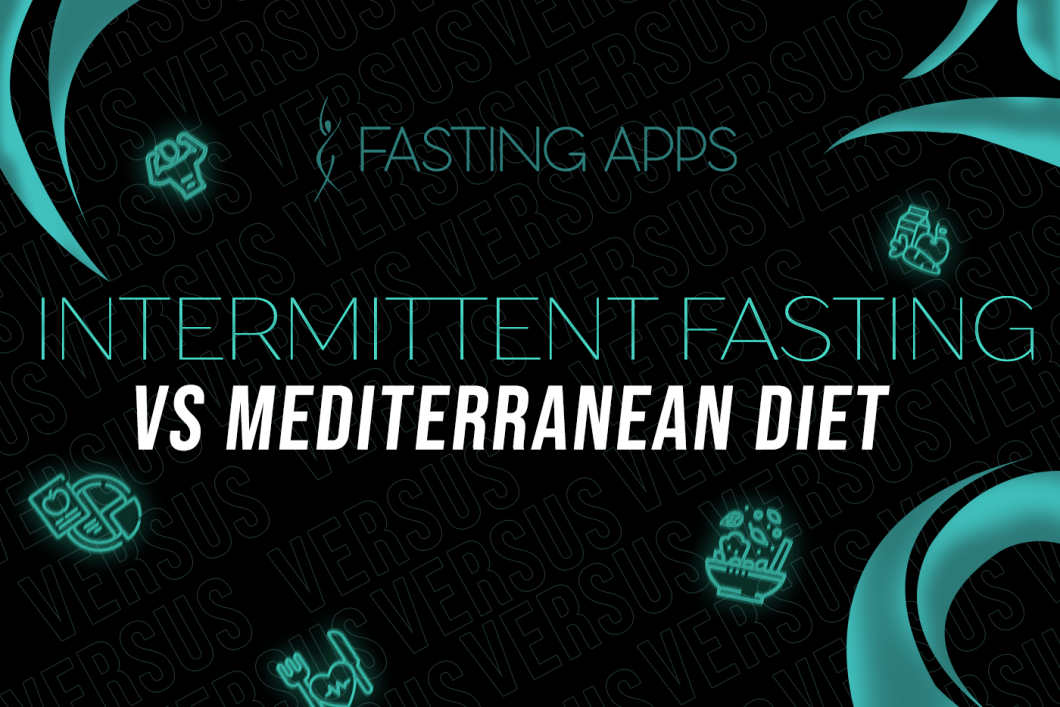Intermittent Fasting vs Mediterranean Diet
Written by Andrew Brewer. ⚕️Reviewed and fact checked by our medical team.

Weight loss is one benefit of intermittent fasting and the Mediterranean diet, but that’s just the beginning. You can completely overhaul your lifestyle when you focus on what you’re eating and when you eat, improving your overall quality of life. The best part is that if you’re torn between the two, you don’t have to choose! The Mediterranean diet can easily be integrated into your intermittent fasting plan, helping you narrow down your meal choices. Just make sure you eat enough protein in addition to your focus on plant-based foods.
Let’s explore why both of these are worth exploring.
Key Takeaways
Both intermittent fasting and the Mediterranean diet have various health benefits, such as reducing bad cholesterol, improving blood sugar levels, and lowering inflammation.
Intermittent fasting limits when you eat, while the Mediterranean diet focuses on healthy food choices, particularly plant-based food.
Both plans require planning and effort, but the Mediterranean diet requires more effort in identifying and purchasing foods that fit into the meal plan.
The two diets can be complementary, and you can integrate the Mediterranean diet into your intermittent fasting plan to get both benefits.
To make an informed decision, it is important to consult a doctor or a registered dietitian to determine which diet plan suits you best based on your lifestyle, health goals, and medical history.
Benefits of Intermittent Fasting
Intermittent fasting doesn’t limit what you eat; it limits when you eat. Once you pick an intermittent fasting plan, you focus your calories during a certain eating window. In theory, you can eat whatever you want, but for the best results, you want to focus on healthy eating. Protein, healthy fats, and fiber will help you feel full longer, pushing through the hunger to help keep you fasting. When you pair healthy eating with intermittent fasting, you will lower your blood sugar, reduce bad cholesterol, and improve disease resistance. You could integrate the Mediterranean diet during intermittent fasting to get both benefits.
Benefits of the Mediterranean Diet
The Mediterranean Diet focuses on healthy eating, integrating lots of plant-based foods like whole grains, vegetables, legumes, fruits, nuts, seeds, herbs, and spices. For healthy fat, you cook with olive oil. You can also eat poultry, dairy, fish, and other seafood in moderation, though you should avoid red meat and sweets. The focus of this diet is to improve heart health, but there are other benefits too. You will reduce your bad cholesterol, improve blood sugar levels, lower inflammation, and more. What you eat is just as important as what you don’t eat on the Mediterranean diet, especially blood sugar.
What are the Differences?
The Mediterranean Diet and intermittent fasting at their core focus on healthy eating, and because of it they have many similar benefits.
Eating Window
Intermittent fasting limits when you eat, so if you select 16/8, you can eat 8 hours per day, and during that time, there is little restriction on what you can eat. If weight loss is your goal, you’ll still want to focus on healthy eating. Unless you add calorie restriction, you don’t need to worry about the amount of calories. The point is to stay in a calorie deficit, burning more than you concern. There is no eating window in the Mediterranean diet.
Food Choices
The Mediterranean diet limits what you can eat, focusing on healthy nutrition, particularly plant based food. You’ll eat a lot of monosaturated fats, omega-3 fatty acids, fiver, and other vitamins and minerals. In doing so, you also want to avoid eating sugar, carbs, dairy, red meats, and saturated fats. You don’t have to avoid them altogether, but you do want to eat them in moderation. By doing so, you’ll reduce your risk of developing heart disease, which is one of the biggest benefits of the Mediterranean diet.
Planning
The amount of planning that you’ll do will vary. Both require advanced planning for the best results, but the mediterranean diet requires more effort. You have to identify the foods that fit into your meal planning, purchases them, and make a commitment to only eat those foods.
How to Choose?
The good news is if you don’t want to choose between the two, you don’t have to. They can be complementary, as long as you don’t mind fasting. Otherwise, identify your eating habits. If you like Medditeranean, Italian, and other foods, this may fit seamlessly in your daily routine.
Our #1 Recommendation: DoFasting
It's easily one of the best intermittent fasting apps that offers plenty of features for anyone!
Use coupon code: 10app to get an extra 10% off all memberships.
FAQ
How does intermittent fasting work?
Intermittent fasting works by reducing the number of calories you consume. By restricting the time when you can eat, you consume fewer calories overall, which can lead to weight loss.
How does the Mediterranean diet work?
The Mediterranean diet promotes healthy eating habits and reduces the risk of chronic diseases. It is rich in plant-based foods, fiber, vitamins, and minerals, and low in saturated fats.
Which is better for weight loss: intermittent fasting or the Mediterranean diet?
Both intermittent fasting and the Mediterranean diet can be effective for weight loss. It depends on individual preferences and lifestyle factors.
Can intermittent fasting and the Mediterranean diet be combined?
Yes, intermittent fasting and the Mediterranean diet can be combined. This is sometimes called the "Mediterranean-style intermittent fasting" and involves following the Mediterranean diet during the eating periods and fasting during the fasting periods.
Which one is more sustainable: intermittent fasting or the Mediterranean diet?
The Mediterranean diet is generally considered more sustainable in the long term than intermittent fasting. The Mediterranean diet is balanced and emphasizes whole foods and can be maintained as a lifestyle. At the same time, intermittent fasting may be more difficult to sustain over the long term.
Which is better for overall health: intermittent fasting or the Mediterranean diet?
Both intermittent fasting and the Mediterranean diet have health benefits. The Mediterranean diet is associated with a lower risk of chronic diseases, while intermittent fasting can improve metabolic health and reduce inflammation. However, it depends on individual preferences and lifestyle factors.

